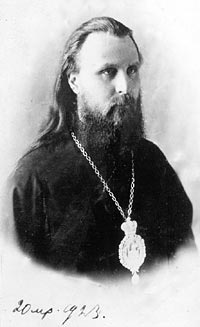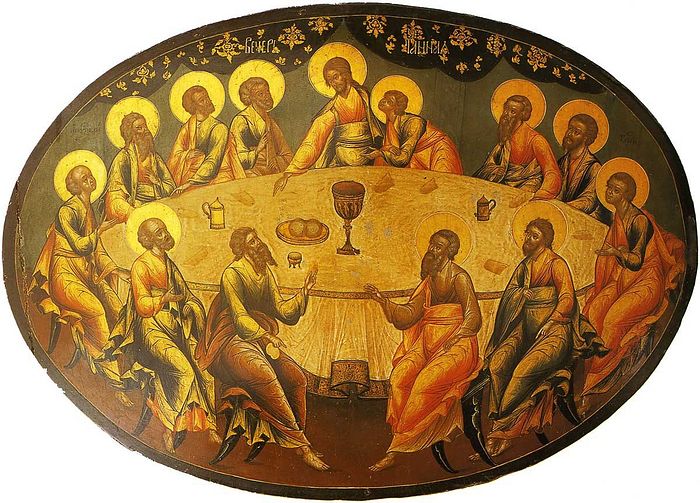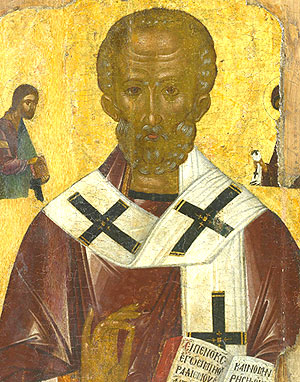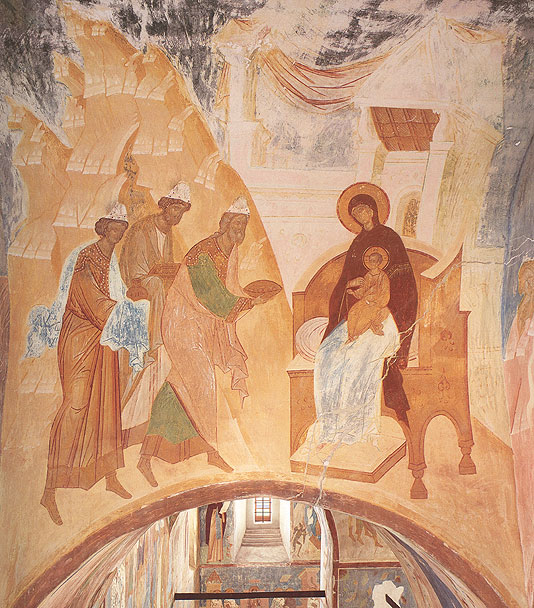Holy Scripture and the Church
 Editor’s Note: The following article was written in 1914[1],when St. Hilarion was an archimandrite and a professor of the Imperial Moscow Spiritual Academy. Its message is especially pertinent for our times, when there is widespread confusion and ignorance about the true nature of Christ’s Church and about the right approach to Holy Scripture. It can provide invaluable help to Orthodox Christians in understanding their Faith more deeply, and in defending and giving an account of it when confronted with heterodox—especially Protestant—claims. At the same time, it can serve as a wake-up call to Protestants, who separate the Bible from the Church, as well as to those Orthodox Christian scholars who have been unduly influenced by the modern “higher criticism” of the Bible which originated within German Protestantism—the fallacies of which are profoundly demonstrated by our modern-day Orthodox apologist, St. Hilarion.
Editor’s Note: The following article was written in 1914[1],when St. Hilarion was an archimandrite and a professor of the Imperial Moscow Spiritual Academy. Its message is especially pertinent for our times, when there is widespread confusion and ignorance about the true nature of Christ’s Church and about the right approach to Holy Scripture. It can provide invaluable help to Orthodox Christians in understanding their Faith more deeply, and in defending and giving an account of it when confronted with heterodox—especially Protestant—claims. At the same time, it can serve as a wake-up call to Protestants, who separate the Bible from the Church, as well as to those Orthodox Christian scholars who have been unduly influenced by the modern “higher criticism” of the Bible which originated within German Protestantism—the fallacies of which are profoundly demonstrated by our modern-day Orthodox apologist, St. Hilarion.
Passing over to true knowledge of God
 Commentary on Luke, Sermons 141 and 142
Commentary on Luke, Sermons 141 and 142
22:7-16. Then came the day of unleavened bread, on which it was fitting for the passover to be sacrificed. And He sent Peter and John, saying, Go and prepare for us the passover, that we may eat. And they said to Him, Where will You that we prepare? And He said to them, Behold, when you have entered into the city, there shall meet you a man carrying a pitcher of water: follow him to the house into which he enters. And say to the master of the house, The Teacher says to you, Where is the guest-chamber, where I may eat the passover with My disciples? And he will show you a large upper room, provided with couches; there make ready. And they went, and found as He said to them; and they made ready the passover. And when the time was come, He lay down to meat, and the twelve apostles with Him. And He said to them, I have desired a desire to eat this passover with you before I suffer: for 1 say to you, that henceforth I twill not eat of it, until it is fulfilled in the kingdom of God.
The law by its shadows prefigured from of old the mystery of Christ: and of this He is Himself the witness where He said to the Jews, If you had believed Moses, you would have believed also Me: for he wrote concerning Me. For everywhere He is set forth, by means of shadows and types, both as slain for us, as the Lamb without blame and true; and as sanctifying us by His life-giving blood. And we further find the words of the holy prophets in complete accordance with those of most wise Moses. But when the fullness of time was come, as Paul says, in which the Only-begotten Word of God was about to submit to the emptying of Himself, and to endure the birth in the flesh of a woman, and subjection also to the law, according to the measure that was fitting for human nature, then He was also sacrificed for us, as the lamb without blame and true, on the fourteenth day of the first month. And this feast-time was called Phasek, a word belonging to the Hebrew language, and signifying the passing over: for so they explain it, and say that this is its meaning.
Life of Saint Nicholas the Wonderworker
 'The truth of things hath revealed thee to thy flock as a rule of faith, an icon of meekness, and a teacher of temperance; for this cause, thou hast achieved the heights by humility, riches by poverty. O Father and Hierarch Nicholas, intercede with Christ God that our souls be saved.'
'The truth of things hath revealed thee to thy flock as a rule of faith, an icon of meekness, and a teacher of temperance; for this cause, thou hast achieved the heights by humility, riches by poverty. O Father and Hierarch Nicholas, intercede with Christ God that our souls be saved.'
So reads the troparion of St Nicholas, hierarch of the Church of Myra in Lycia (now Demra in Turkey), known as 'wonderworker' and 'father' throughout the Christian world. He is beloved in the Orthodox Church, and indeed far beyond, for his kindness, almsgiving and aid, meted out both during his earthly life and after. As one of the multitude of English lives of the saint joyously proclaims, 'he is one of the best known and best loved saints of all time.' And in another: 'The name of the great saint of God, the hierarch and wonderworker Nicholas, a speedy helper and suppliant for all hastening to him, is famed in every corner of the earth, in many lands and among many peoples. In Russia there are a multitude of cathedrals, monasteries and churches consecrated in his name. There is, perhaps, not a single city without a church dedicated to his honour.'
St. Nicholas, Equal of the Apostles and Archbishop of Japan
 Saint Nicholas, Enlightener of Japan Ivan Dimitrievich Kasatkin was born on August 1, 1836 in the village of Berezovsk, Belsk district, Smolensk diocese, where his father served as deacon. At the age of five he lost his mother. He completed the Belsk religious school, and afterwards the Smolensk Theological Seminary. In 1857 Ivan Kasatkin entered the Saint Peterburg Theological Academy. On June 24, 1860, in the academy temple of the Twelve Apostles, Bishop Nectarius tonsured him with the name Nicholas.
Saint Nicholas, Enlightener of Japan Ivan Dimitrievich Kasatkin was born on August 1, 1836 in the village of Berezovsk, Belsk district, Smolensk diocese, where his father served as deacon. At the age of five he lost his mother. He completed the Belsk religious school, and afterwards the Smolensk Theological Seminary. In 1857 Ivan Kasatkin entered the Saint Peterburg Theological Academy. On June 24, 1860, in the academy temple of the Twelve Apostles, Bishop Nectarius tonsured him with the name Nicholas.
The Word Became Flesh. A Sermon on the Nativity of Christ
 The Word became flesh; that is, the Son of God, co-eternal with God the Father and with the Holy Spirit, became human – having become incarnate of the Holy Spirit and the Virgin Mary. O, wondrous, awesome and salvific mystery! The One Who had no beginning took on a beginning according to humanity; the One without flesh assumed flesh. God became man – without ceasing to be God. The Unapproachable One became approachable to all, in the aspect of an humble servant. Why, and for what reason, was there such condescension [shown] on the part of the Creator toward His transgressing creatures – toward humanity which, through an act of its own will had fallen away from God, its Creator?
The Word became flesh; that is, the Son of God, co-eternal with God the Father and with the Holy Spirit, became human – having become incarnate of the Holy Spirit and the Virgin Mary. O, wondrous, awesome and salvific mystery! The One Who had no beginning took on a beginning according to humanity; the One without flesh assumed flesh. God became man – without ceasing to be God. The Unapproachable One became approachable to all, in the aspect of an humble servant. Why, and for what reason, was there such condescension [shown] on the part of the Creator toward His transgressing creatures – toward humanity which, through an act of its own will had fallen away from God, its Creator?






